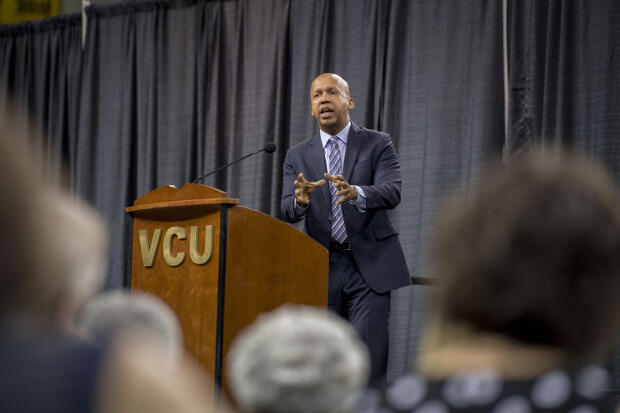
<br>Photo by Allen Jones
April 13, 2017
At VCU, ‘Just Mercy’ author Bryan Stevenson reminds us we are ‘more than the worst we’ve ever done’
Share this story
Bryan Stevenson, author of Virginia Commonwealth University’s 2016-17 common book, “Just Mercy: A Story of Justice and Redemption,” told a crowd of hundreds at the Stuart C. Siegel Center on Wednesday that he could talk to them all night about the problems in the criminal justice system.
He could talk, he said, about how the number of incarcerated people has grown from 300,000 in 1972 to 2.3 million today — making the U.S. the most punitive society on the planet. Or how 70 million Americans have a criminal record, putting them at an often insurmountable disadvantage when applying for a job or loan. Or how 70 percent of women going to prison are single mothers with minor children, thereby displacing the children. Or how 50 years after the passage of the Voting Rights Act, nearly 30 percent of black men in Stevenson’s home state of Alabama have permanently lost the right to vote because of a criminal conviction.
“I could talk all night about the problems that we’re facing in the criminal justice system, the problems we’re facing like immigration, bigotry, discrimination against the poor, the elderly, communities that feel vulnerable and marginalized,” Stevenson said. “But I don’t want to talk about problems tonight. I want to talk about solutions.”
“Just Mercy,” Stevenson’s 2014 memoir, tells the story of his work with the Equal Justice Initiative, a legal practice he founded in Montgomery, Alabama dedicated to eliminating excessive and unfair sentencing, exonerating wrongfully convicted death row prisoners, stopping the abuse of the incarcerated and the mentally ill, and aiding children who have been prosecuted as adults.
The book was selected for VCU’s university wide, yearlong Common Book Initiative, which aims to pick a book each year that touches on societal issues that have no easy answers, encourage students to move beyond singular solutions to complex problems. Copies of the book were distributed to 3,500 incoming first-year students, as well as to members of the university and Richmond communities, and all were encouraged to read the book and reflect on its themes of pursuing mercy and justice in society.
We need more hope. We need more mercy. We need more justice in America.
Stevenson’s talk — sponsored by University College and the Office of the Provost — capped a year of events at VCU and in the Richmond community organized by the Common Book Initiative and inspired by “Just Mercy.”
In his lecture, Stevenson said that changing the world is possible, and he laid out several specific lessons from his journey that could help make that change come about.
“We need more hope. We need more mercy. We need more justice in America. And there are challenges that we’ve got to meet,” he said. “And I think it’s not too ambitious to say, we’ve got to change the world.”
‘It’s in proximity that we can change the world’
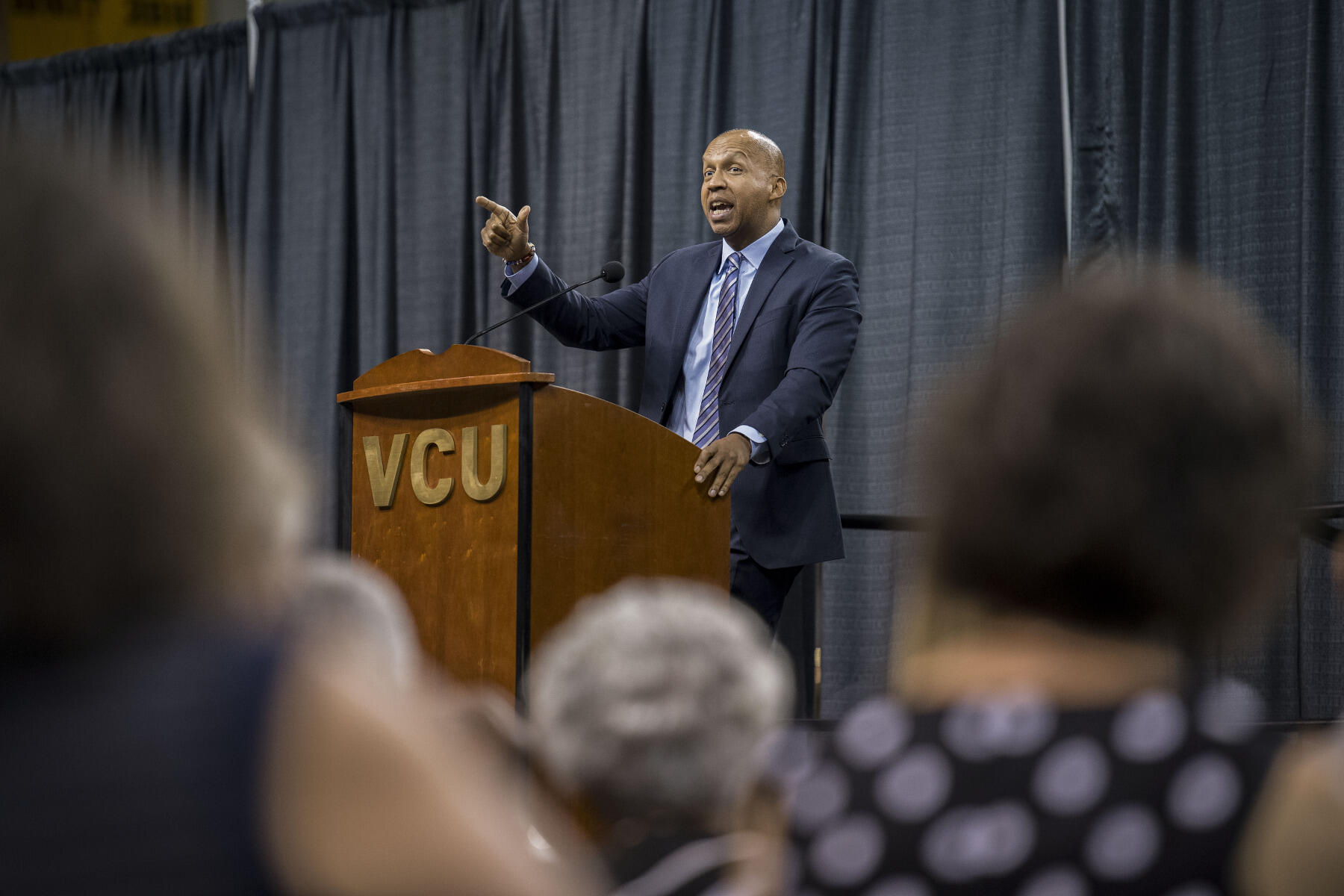
For those who want to change the world, Stevenson said, the first step is they must get proximate to the people who are suffering, who are being excluded, who are being disfavored and who are being incarcerated.
“We cannot change the world from a distance,” he said. ‘We’ve got a lot of politicians proposing solutions, but their solutions don’t work because they’re rooted in a kind of distance that doesn’t allow the solutions to be grounded in a kind of understanding of the problem. When you get close to a problem, you see the details, you see the nuances.”
The only way to stop suffering, he said, is to get close to those who are suffering and create meaningful connections and relationships.
“Many of us have been taught, if there’s a bad section of town, if there’s sections of this community where there’s a lot of violence or neglect or despair or poverty or suffering, many of us have been taught to stay as far away from those part of town as possible,” he said. “We all need to get closer to the parts of Richmond, to the parts of our community where there’s despair and hopelessness and addiction and violence because it’s in proximity that we can change the world.”
Stevenson said he benefited from Richmond civil rights lawyer Oliver Hill’s decision to get proximate to the community where Stevenson grew up, as Hill successfully forced the county to desegregate its schools.
“When I see his name on the street [in Richmond] it does something to me. Because that man in that community made it possible for me to go to high school,” he said. “But for his choice to get proximate to poor black kids like me, I wouldn’t be standing here talking to you today.”
As a young man, Stevenson said, he discovered his mission in life because he found himself in proximity to people who were suffering. As a student at Harvard Law School, Stevenson felt disenchanted and directionless until he started interning with an organization that provided legal services to people on death row.
“I’d been there a week when one of the lawyers said, ‘We need you to go to death row, we need you to just explain to someone that he’s not at risk of execution anytime in the next year,’” he said. “‘We haven’t had time to meet him. You go down there and just tell him he’s not at risk of execution and that someone will be down to see him soon.’”
As he drove to the prison, Stevenson felt nervous that the condemned man would be upset that the organization sent a law student with no experience. The prisoner was so shackled it took 10 minutes for guards to free him.
“I’m so sorry,” Stevenson told him. “I’m just a law student. I don’t know anything about the death penalty. I don’t know anything about appellate procedure. I don’t know anything about criminal procedure. I don’t know anything about civil procedure. They just sent me down here to tell you that you’re not at risk of execution anytime in the next year.”
The prisoner responded, “Wait, wait, wait. Say that again.”
Stevenson repeated that the man was not at risk of execution in the next year. The man made him repeat it yet again.
“That’s when this man grabbed my hands and said, ‘Thank you, thank you, thank you. You’re the first person I’ve met in the two years that I’ve been on death row who’s not a death row prisoner or a death row guard.’ He said, ‘I’ve been talking to my wife and my kids at night on the phone, but I wouldn’t let them come visit because I was afraid that I’d have an execution date and I didn’t want them to have to deal with that.’ He said, ‘Because of you, I’m going to see my wife, I’m going to see my kids. Thank you, thank you, thank you.’”
Stevenson and the prisoner spoke for three hours before the guards roughly removed the prisoner and took him back to his cell. As he left, he started to sing: “I'm pressing on the upward way, New heights I'm gaining every day; Still praying as I onward bound, ‘Lord, plant my feet on higher ground.’”
“When I heard that man sing, everything changed for me,” Stevenson said. “In that instant, I knew I wanted to help condemned people get to higher ground. But more than that, I knew that my journey to higher ground was tied to his journey. I realized that if he doesn’t get there, I can’t get there. And he radicalized my interest in the law. I went back to Harvard Law School, you couldn’t get me out of the law school library.”
Stevenson couldn’t believe, in in his ignorance, how being proximate could make such a difference in someone’s life.
Changing narratives
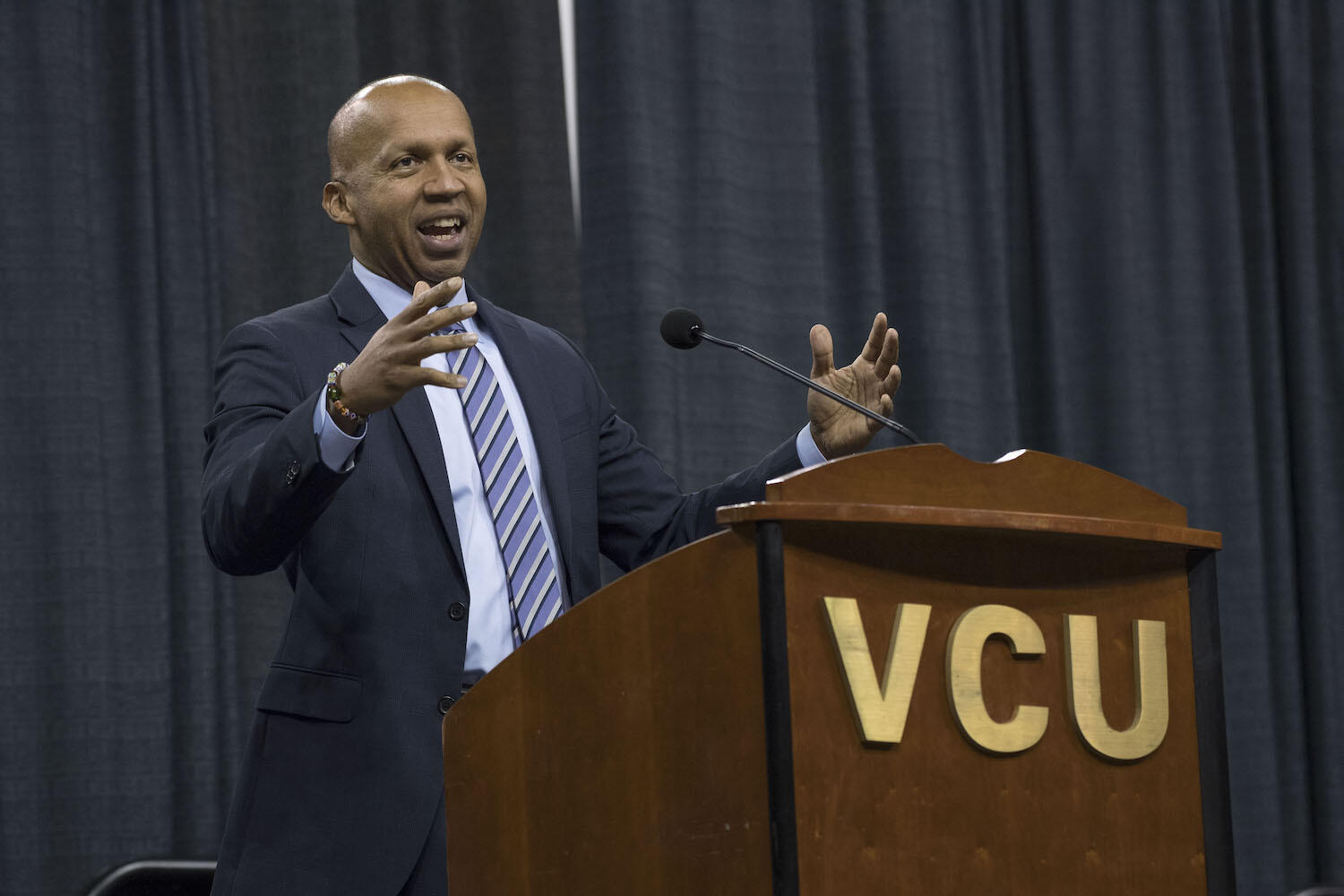
The second thing Stevenson encouraged the crowd to do was to change the narratives that sustain inequality and injustice, which he argued often underlie and justify problematic policies.
“We have mass incarceration in this country because of policy choices,” he said. “We decided that drug addiction and drug dependency is a crime issue. We could have said it’s a health issue. We’ve now put hundreds of thousands of people in jails and prisons because we made that policy choice. But beneath that policy choice is a narrative. And that narrative has to change. We didn’t say alcoholism is a crime. We said alcoholism is a disease. If we see someone we know is an alcoholic going into a bar, we don’t say let’s call the police. But with drug addiction, we say it’s a crime.”
The narrative of the death penalty must also change, he said, noting that Virginia is scheduled to execute a man, Ivan Teleguz, on April 25.
“The question about the death penalty for me is not, ‘Do people deserve to die for the crimes they’ve committed?’ The question is, ‘Do we deserve to kill?’” Stevenson said. “We have a system that is oftentimes unreliable and unfair. For every nine people that we’ve executed in America, we’ve now identified one innocent person on death row. We’ve got to change the narrative. I hope the governor stops that execution.”
He also argued that we must change the narratives surrounding children, specifically the idea — formed by criminologists 30 or 40 years ago — that some children, often black or brown children, are irredeemable “super criminals.”
We created this pipeline from our school house to our jail house.
“We created this pipeline from our school house to our jail house,” he said. “We started talking about zero tolerance. And what that meant was suspending kids and expelling kids and criminalizing kids. Every state in the country lowered the minimum age for trying children as adults. I represented 14-year-old children in this state who’d been sentenced to die in prison — life in prison without parole. There are 13 states with no minimum age for trying children as adults. I’ve actually represented 9- and 10-year-old children facing 50- and 60-year sentences in adult jails and prisons.”
The narrative must change to reflect the understanding that all children are children, he said.
“We cannot be committed to our future, we cannot be committed to our children, if we allow ourselves to believe that we don’t have children, that we instead have ‘super predators,’ that we can throw away the kids who are dealing with addiction and despair,” he said. “We cannot judge our commitment to children by looking at how we treat gifted children and talented children and privileged children. Our measure of commitment to children has to be reflected in how we’re dealing with kids who are struggling with abuse and neglect and trauma and joining gangs. It’s those children who really reflect our commitment to helping kids succeed.”
One of the biggest narratives of all that must change, Stevenson said, is that of racial difference, which was rooted in slave holders’ need to legitimize slavery through the ideology of white supremacy.
“They said, ‘Black people are different than white people. They can’t do this, they can’t do that.’ That narrative of racial difference was the true evil of American slavery,” he said. “When I read the 13th Amendment, it doesn’t talk about the narrative of racial difference, it doesn’t talk about the ideology of white supremacy, it talks about involuntary servitude and forced labor. And because of that, I don’t think slavery ended in 1865. I think it just evolved. It turned into decades of terror and violence.”
In Virginia and other parts of the country, the era following slavery was marked by terrorism, in which black people were lynched, murdered and brutalized. The United States has failed to confront its legacy of racial terror, Stevenson said, even as its effects can be seen today in the demographic geography of the country.
“The black people in Cleveland and Chicago and Detroit and Los Angeles and Oakland and Minneapolis did not go to those communities as immigrants looking for new economic opportunities,” he said. “They went into those communities as refugees and exiles from terror in the American south.”
The narrative of racial difference continues to harm people of color today through negative assumptions and prejudice.
“When I look out into this audience, and I see students of color — black and brown students — it breaks my heart to have to tell you, even if you’re an ‘A’ student at VCU, even if you’re a star athlete, even if you do really well in class, even if you are very gifted and talented, you will still go places in this country where you will be perceived to be dangerous and guilty because of your color,” he said.
Stevenson called for the United States to reconcile with its violent racist past, much like other countries have had to reconcile with histories of genocide and oppression.
“When you go to South Africa, they make you understand the legacy of apartheid. Go to Rwanda, they make you listen to the horrors of the genocide. Go to Berlin today and you can’t go a hundred meters without seeing markers and stones that have been placed next to the homes of Jewish families that were abducted during the Holocaust. The Germans want you to go to the Holocaust memorial in Berlin,” he said. “But in this country, we don’t talk about slavery. We don’t talk about lynching. We don’t talk about segregation.”
He noted that a movement in Richmond is seeking to elevate the story of slavery in the community. He urged the crowd to get behind that effort.
“You shouldn’t live in Richmond and not know where the slave auction sites were,” he said.
‘Your hopefulness is your power’
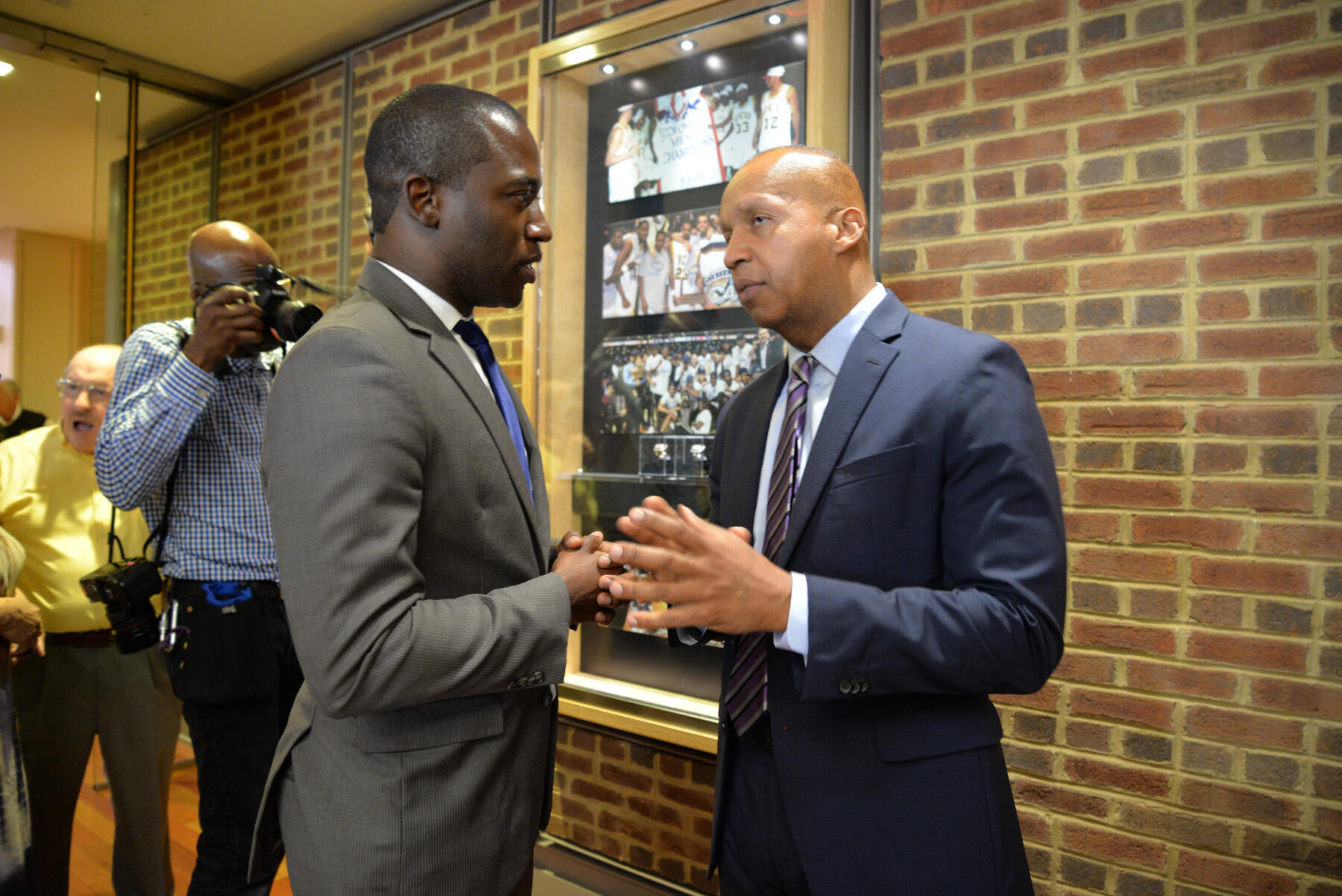
Stevenson’s third piece of advice is to stay hopeful and to commit to being hopeful — even in the most unlikely of circumstances.
“You cannot commit to changing the world if you lose your hope,” he said. “Hopelessness is the enemy of justice. Justice never prevails where hopelessness persists. And if you’re not hopeful, to be honest, you’re sort of the problem. Your hope is what gets you to stand up when other people say sit down. Hope is what gets you to speak when other people say be quiet. Your hope is your power. Your hope can change the world.”
He feels hopeless, he said, when he hears people romanticizing the country’s racist past, looking back fondly on the days of segregation, inequality and fear among people of color.
“In Alabama, Confederate Memorial Day is a state holiday. I don’t like it,” Stevenson said. “Jefferson Davis’ birthday is a state holiday. I don’t like it. We don’t have Martin Luther King Day in Alabama, we have Martin Luther King/Robert E. Lee Day. I like don’t the Confederate flag. I don’t like these symbols of resistance.”
“When people talk about ‘Make American great again,’ I can’t figure out which decade they’re talking about.”
Stevenson told a story about a humiliating encounter he had with a racist prison guard while visiting a prisoner on death row. The guard forced Stevenson to submit to a strip search and other indignities, and even pointed out his truck in the parking lot, covered in Confederate flags and a bumper sticker that read, “If I’d known it was going to be like this, I would have picked my own cotton.’”
Later, that same guard was present as Stevenson defend his client in court, describing how his client had been in 29 foster homes by age 10, was suffering from bipolar disorder by age 13, was self-medicating with crack and heroin and homeless by age 17, and who had a psychotic episode at 19 in which he killed a man he thought was a demon.
“I read through his record, I couldn’t find the words mental illness, mental disease, mental disability anywhere in that transcript,” Stevenson said. “One of the challenges we have in our legal system is that we have a system in too many places that treats you better if you’re rich and guilty than if you’re poor and innocent.”
The next time Stevenson visited his client, he encountered the guard again. This time, however, the guard was respectful.
“He said, ‘Mr. Stevenson, I was in that courtroom when you did that hearing and I was listening.’ He said, ‘I’m glad you’re here because I want to tell you something: I came up in the foster system too. I had it really bad. I didn’t think anybody had it as bad as I did. But listening in that courtroom, I realized that maybe your client had it worse than I did,’” Stevenson said.
“And then he said, ‘Mr. Stevenson, I’m glad you’re here because there’s something I want you to know: Mr. Stevenson, I want you to know that I think what you’re doing is a good thing.’ And then he looked at me and said, ‘Mr. Stevenson, I hope you keep fighting for justice.’”
‘Each of us is more than the worst we’ve ever done’
Finally, Stevenson told the crowd that changing the world requires people to do uncomfortable things.
“I’ve been practicing law for 32 years. I’ve had the great privilege of representing people and winning their freedom. I’ve walked men out of death row. I’ve stood with women who had been wrongly condemned and seen them embrace their family after being wrongly convicted. I’ve had these glorious moments,” he said. “But I must tell you I’ve also had painful moments.”
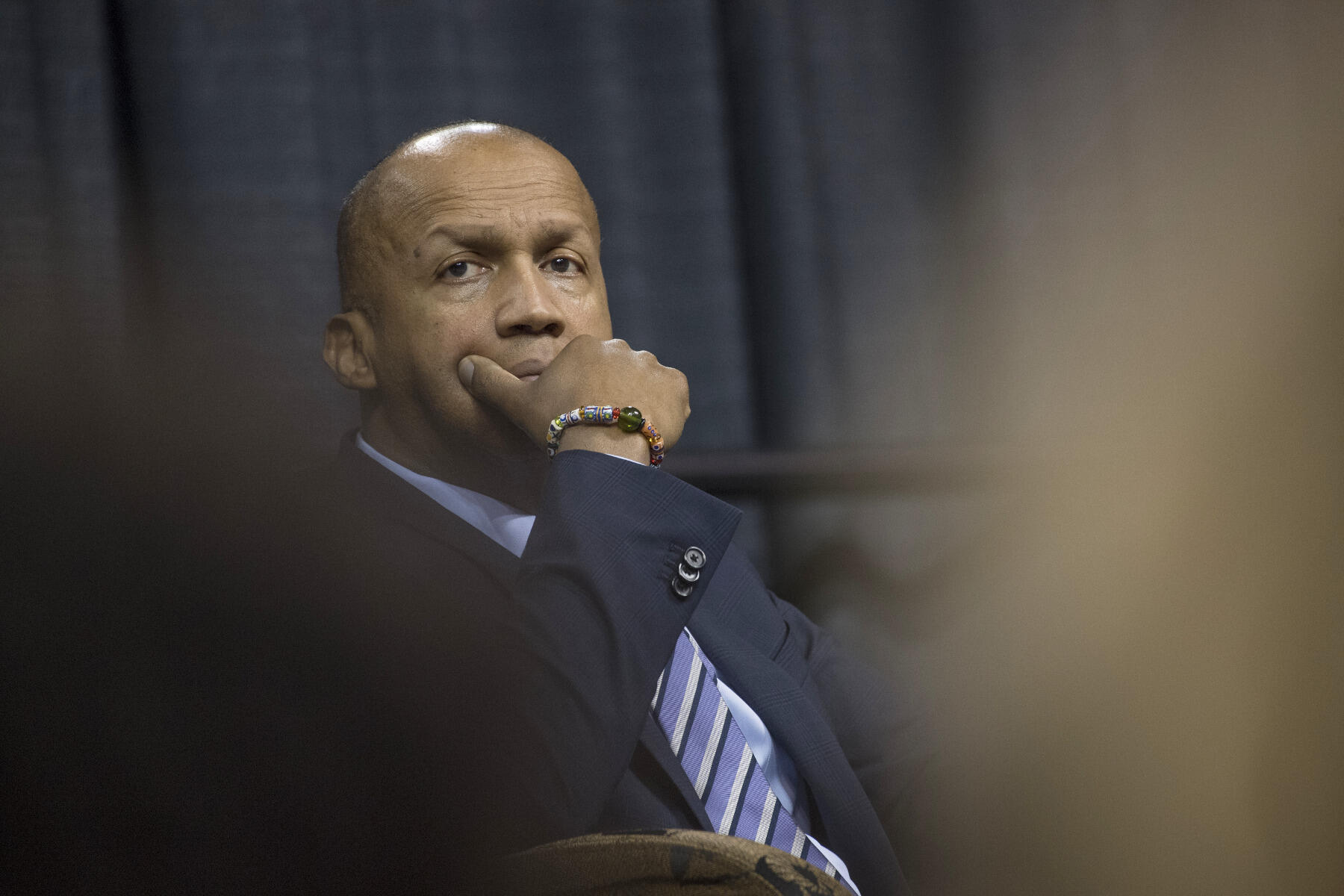
He described how he took on a client with mental illness and disabilities who was on death row. The client’s mental problems had never been brought up by his previous lawyers, and Stevenson was petitioning every possible court to halt the execution that was slated to occur in 30 days. Every court denied the request, saying it was too late.
Stevenson called the client, and had to tell him, “I’m so sorry, but I cannot stop this execution.”
The man, sobbing and struggling the get out his words because of a speech impediment, told Stevenson, “‘Mr. Stevenson, I want to thank you for representing me.’” Stevenson said. “And then he said, ‘Mr. Stevenson, I want to thank you for fighting for me.’ And the last thing he said to me was, ‘Mr. Stevenson, I love you for trying to save my life.’”
“He hung up the phone. They pulled him away. They strapped him to a gurney. And they executed him,” Stevenson said. “I held the phone and I said, ‘I can’t do this anymore. It’s too hard. It’s just too hard.’”
As he sat there, feeling lost, he thought about how his client was broken.
What is it about us that we want to kill all the broken people?
“What is it about us that we want to kill all the broken people? Why is it that when we see brokenness, we want to crush it and hurt it and kill it? And then I realized, all of my clients are broken people. I represent the broken. My clients have been broken by poverty, broken by disability, broken by racism, broken by neglect,” he said. “And then I realized I work in a broken system where the people in power are unwilling to get proximate, they’re locked into narratives of fear and anger, they’ve lost their hope, they won’t do uncomfortable things.”
Stevenson realized that he too is broken and that he can’t stop fighting for justice and mercy.
“The truth is that if you get proximate, if you change narratives, if you stay hopeful, if you do uncomfortable things, you’re going to get broken a little bit, you’re going to be pushed and cracked and there’s going to be moments of suffering and pain and anguish, but I’m here to tell you that it is the broken among us that are going to lead us to mercy and justice. It’s the broken who understand the power of redemption,” he said.
“It’s not the whole and the perfect that are going to change the world, it’s actually the broken because I realized I’m not just trying to save somebody else, I’m trying to save myself.”
More than anything, he added, is the lesson that all of us are “more than the worst we’ve ever done.”
“If somebody tells a lie, they’re not just a liar. If someone takes something, they’re not just a thief. Even if you kill someone, you’re not just a killer,” he said. “And justice requires that we know what else people are.”
Subscribe for free to the VCU News email newsletter at http://newsletter.news.vcu.edu/ and receive a selection of stories, videos, photos, news clips and event listings in your inbox every Monday and Thursday.
Subscribe to VCU News
Subscribe to VCU News at newsletter.vcu.edu and receive a selection of stories, videos, photos, news clips and event listings in your inbox.













